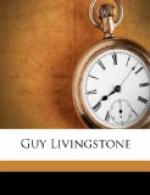“Mr. Raymond is very like most calm, comfortable old men with a life interest in L2000 a year,” Charley said; “rather more cold and impassible than the generality, perhaps. He must be clever, for he plays whist better than any one I know; but not brilliant, certainly. His daughter is”—the color deepened on his cheek perceptibly—“very charming, most people think; but I hate describing people. I always caricature the likeness. You’ll form your own judgment at dinner. Shall we go in? We shoot an outlying cover after luncheon, and the blackthorns involve gaiters.”
We had very fair sport, and were returning across the park, picking up a stray rabbit every now and then in the tufts of long grass and patches of brake. One had just started before Forrester, and he was in the act of pulling the trigger, when Livingstone said suddenly,
“There’s my uncle’s carriage coming down the north avenue.”
It was an easy shot in the open, but Charley missed it clean.
“What eyes you have, Guy,” he said, pettishly; “but I wish you wouldn’t speak to a man on his shot.”
Guy’s great Lancaster rang out with the roar of a small field-piece, and the rabbit was rolling over, riddled through the head, before he answered,
“Yea, my eyes are good, and I see a good many things, but I don’t see why you should have muffled that shot, particularly as my intelligence was meant for the world in general, and it was not such an astounding remark, after all.”
Charley did not seem ready with a reply, so he retained his look of injured innocence, and walked on, sucking silently at his cigar. The Raymonds reached the house before us; but, not being in a presentable state, I did not see them before dinner.
Forrester was right; there was nothing startling about Mr. Raymond. He had one of those thin, high-bred looking faces that one always fancies would have suited admirably the powder and ruffles of the last century. It expressed little except perfect repose, and when he spoke, which was but seldom, no additional light came into his hard blue eyes. His daughter was his absolute contrast—a lovely, delicate little creature, with silky dark-brown hair, and eyes en suite, and color that deepened and faded twenty times in an hour, without ever losing the softness of its tints. She had the ways of a child petted all its life through, that a harsh word would frighten to annihilation. She seemed very fond of Guy, though evidently rather afraid of him at times.
Nothing passed at dinner worth mentioning; but soon after the ladies left us, Mr. Raymond turned lazily to his nephew to inquire,
“If he would mind asking Bruce to come and stay at Kerton, as he was to be in the neighborhood soon after Christmas.”
He did not seem to feel the faintest interest in the reply.
“I shall be too glad, Uncle Henry,” answered Guy (he did not look particularly charmed though), “if it will give you or Bella any pleasure. Need he be written to immediately?”




